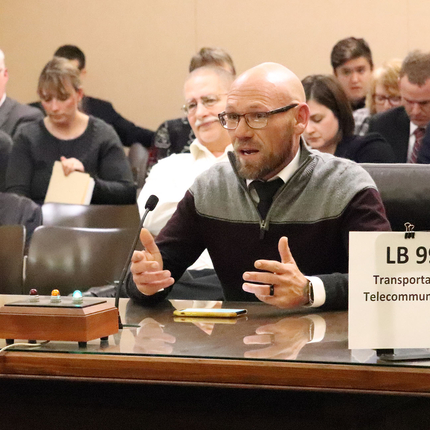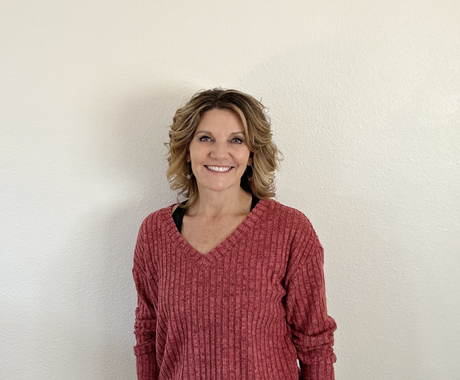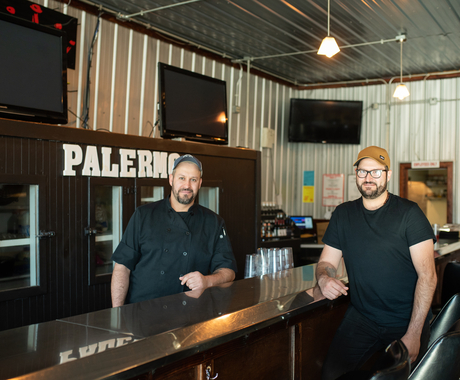By Teresa Hoffman, former staff member
Frustrated by the lack of internet service for his home in rural Antelope County, Nebraska Mike Tabbert just wanted to find someone who would listen.
So, he picked up the phone and started calling every acronym in the book—the FCC (Federal Communications Commission), FTC (Federal Trade Commission), and NTCA (the Rural Broadband Association), as well as his representatives in Lincoln and Washington, D.C.
In his quest for information, he also reached out to the Center for Rural Affairs, an entity he admittedly didn’t know much about. The “luck of the draw” encounter, as he calls it, put him on a path to advocacy not only for himself, but other residents looking for improved broadband access in their rural communities.
For his efforts, Mike has been awarded the 2020 Citizenship Award, given to an individual or individuals who actively participate in the civic process for creating public policy, and who work closely with the Center for Rural Affairs to advance public policies that strengthen family farms, ranches, and rural communities.
Though not a stranger to advocating for causes he’s passionate about, Mike’s testimony before the Nebraska Legislature’s Transportation and Telecommunications Committee in February 2020 was his first. He joined others in voicing his support for Legislative Bill 996, which was drafted by the Center in partnership with Sen. Tom Brandt’s office.
The bill sought to create the Broadband Data Improvement Program, to ensure the state is able to fully access federal broadband grant programs by complying with data verification requirements set forth by the FCC as part of the establishment of the Digital Opportunity Data Collection (DODC) program.
Mike shared how obtaining service for his rural home hadn’t been easy or convenient and, when all was said and done, he will spend more than $12,000 for the service he and his husband, Brian, need to work from home.
Though he was nervous, Mike believes all the supporters who testified that day made a “pretty big impact.”
“I think we may have opened some of their eyes to how bad we really have it out here as far as the internet is concerned,” Mike said.
LB 996 would go on to receive unanimous approval from the Legislature and was signed into law by Gov. Pete Ricketts over the summer.
Testifying wasn’t the only contribution Mike made. After contacting the Center, he assisted with grassroot efforts to find additional supporters.
“Within a few weeks, he had gathered a dozen other people with their own broadband issues, allowing us to put together a collection of stories to share with lawmakers,” said Johnathan Hladik, policy director for the Center for Rural Affairs.
Additionally, Mike penned a letter to the Lincoln Journal Star and encouraged others to send letters to the legislative committee.
Mike thanked the Center for the award and for its continued effort to keep rural broadband at the forefront of the conversation. But, just as important, he thanked them for listening.
“I had made so many phone calls and sent emails and spent so much time trying to get somebody to solicit and you guys listened and helped provide a path to my state representative, a path to that committee, and a path to that bill,” he said. “You helped educate me on the process and now next time, I will know what to expect.”
While LB 996 was successful, Mike’s advocacy work is far from over. This year, he submitted written testimony on a few bills, including a couple addressing broadband.
“I used my experience with the Center and your guidance to better formulate my letters and the information I put into them to hopefully become part of the record for some of these bills,” he said.
Though he’s been able to address his service issues, Mike knows there are others who continue to struggle, therefore, the work is not done.
“Even though I have the internet at my house now, I know that my neighbor down the road doesn’t,” he said. “I know the community that I go to buy my groceries still has crappy internet. It is something that is near and dear to my heart.”
Through his advocacy efforts, Mike said he often hears from people who feel passionate about a subject, but don’t know what they can do to get their voice heard.
His advice—pick up the phone.
“Nine times out of 10 you’ll get a voice mail,” he said. “Leave a message. Or, if you don’t want to call, send an email.”
The important part, he said, is to just do something.
“I believe that if you don’t advocate for yourself, there’s nobody advocating for you,” he said.
Feature photo: Mike Tabbert testifies before the Nebraska Legislature's Transportation and Telecommunications Committee during a 2020 hearing on Legislative Bill 996. | Photo by Teresa Hoffman





